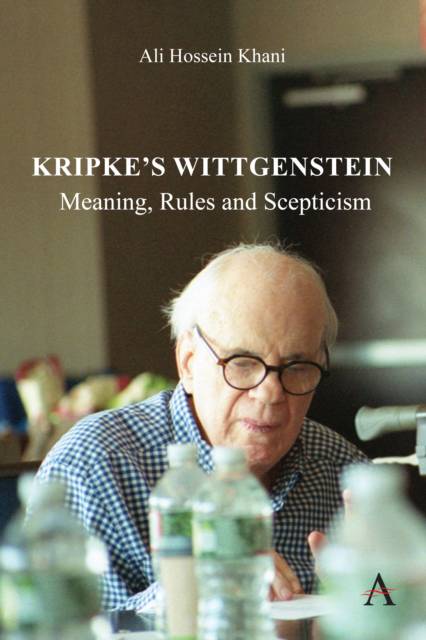
- Afhalen na 1 uur in een winkel met voorraad
- Gratis thuislevering in België vanaf € 30
- Ruim aanbod met 7 miljoen producten
- Afhalen na 1 uur in een winkel met voorraad
- Gratis thuislevering in België vanaf € 30
- Ruim aanbod met 7 miljoen producten
Zoeken
Omschrijving
A philosophical exploration of Kripke's Wittgenstein: Examining Saul Kripke's interpretation of the later Wittgenstein and the major responses to it since the 1980s. Saul Kripke's groundbreaking reading of Wittgenstein, set out in Wittgenstein on Rules and Private Language (1982), has sparked intense discussion for over forty years. This book provides a clear and comprehensive account of Kripke's interpretation, guiding readers through the central 'Sceptical Argument', the 'Sceptical Solution', the 'Problem of Other Minds' and the major philosophical responses that have followed. It illuminates both the subtleties and the lasting significance of Kripke's approach to meaning and rule-following. The work is organised in two parts: Part I focuses on Kripke's Wittgenstein, while Part II examines the criticisms and responses that his reading has provoked.
- Part I explains the sceptical argument Kripke attributes to Wittgenstein, which challenges the classical realist view that there are facts about what speakers mean by words. It then explores the sceptical solution, showing how ordinary linguistic practices allow us to ascribe meaning and rule-following to one another. Attention is also given to the problem of other minds, highlighting the additional complexities that arise when we attempt to extend sensation concepts from ourselves to others.
- Part II surveys the principal responses from leading philosophers since the 1980s, including John McDowell, Simon Blackburn, Gordon Baker and Peter Hacker, Colin McGinn, Crispin Wright, Paul Boghossian, Philip Pettit, Barry Stroud, Hannah Ginsborg, Alexander Miller, George Wilson, Scott Soames, Noam Chomsky, Paul Horwich, as well as Norman Malcolm, Donald Davidson, David Lewis, Christopher Peacocke, Jerry Fodor, David Stern, Alex Byrne, Ruth Millikan, Hilary Putnam and John Searle. By systematically analysing these reactions, the book offers an accessible yet thorough reassessment of Kripke's reading and its profound impact on debates about language, meaning and the philosophy of mind.
- Part I explains the sceptical argument Kripke attributes to Wittgenstein, which challenges the classical realist view that there are facts about what speakers mean by words. It then explores the sceptical solution, showing how ordinary linguistic practices allow us to ascribe meaning and rule-following to one another. Attention is also given to the problem of other minds, highlighting the additional complexities that arise when we attempt to extend sensation concepts from ourselves to others.
- Part II surveys the principal responses from leading philosophers since the 1980s, including John McDowell, Simon Blackburn, Gordon Baker and Peter Hacker, Colin McGinn, Crispin Wright, Paul Boghossian, Philip Pettit, Barry Stroud, Hannah Ginsborg, Alexander Miller, George Wilson, Scott Soames, Noam Chomsky, Paul Horwich, as well as Norman Malcolm, Donald Davidson, David Lewis, Christopher Peacocke, Jerry Fodor, David Stern, Alex Byrne, Ruth Millikan, Hilary Putnam and John Searle. By systematically analysing these reactions, the book offers an accessible yet thorough reassessment of Kripke's reading and its profound impact on debates about language, meaning and the philosophy of mind.
Specificaties
Betrokkenen
- Auteur(s):
- Uitgeverij:
Inhoud
- Aantal bladzijden:
- 250
- Taal:
- Engels
- Reeks:
- Reeksnummer:
- nr. 1
Eigenschappen
- Productcode (EAN):
- 9781839990151
- Verschijningsdatum:
- 5/05/2026
- Uitvoering:
- Hardcover
- Formaat:
- Genaaid
- Afmetingen:
- 152 mm x 229 mm
- Gewicht:
- 453 g

Alleen bij Standaard Boekhandel
+ 216 punten op je klantenkaart van Standaard Boekhandel
Beoordelingen
We publiceren alleen reviews die voldoen aan de voorwaarden voor reviews. Bekijk onze voorwaarden voor reviews.








